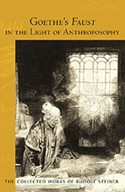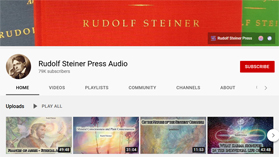
-
GOETHE'S FAUST IN THE LIGHT OF ANTHROPOSOPHY
Spiritual-Scientific Commentaries on Goethe’s Faust, Vol. 2
This volume is the sequel to Anthroposophy in the Light of Goethe’s Faust
Rudolf Steiner

By late 1916, Rudolf Steiner had become an important interpreter of Goethe and frequently discussed Faust—probably Goethe’s greatest work—from the perspective of anthroposophic Spiritual Science. Although Steiner’s readings are unconventional and unsystematic, his insights into the text are penetrating and prescient, opening scholarly avenues not discovered or pursued by others until decades later and, in some cases, still await fuller elaboration.
Steiner’s account is completely unlike those of his contemporaries, including those Goethean scholars he most admired. His approach is not a philological construction of the ideal text, a positivistic account of the biographical genesis of the work or influences on Goethe, an intellectual and historical recasting of the drama as implied philosophical argument, or a view of the tale through the lens of an especially refined sensibility. Steiner’s discussions veer into each of these arenas, but, invariably, he steers back to his original course, stressing the least realistic, least historical, and least romantic aspects of Goethe.
Steiner contributed to the scholarship on Faust by, above all, opening new aesthetic perspectives; by revealing the centrality of Greek Mystery religion within the archetypal unconscious of Faust; by showing the duality of evil latent within Goethe’s text; and by exploring an alchemical transformation of consciousness.
In this volume, Steiner anticipates the best of Goethe’s Faust by helping us to see the Neoplatonic Faust, the Hermetic Faust, the archetypal Faust—in short, the esoteric Faust.
Goethe's Faust in the Light of Anthroposophy is a translation from German of Geisteswissenschaftliche Erläuterungen zu Goethes 'Faust', in 2 Bdn., Bd.2, Das Faust-Problem (GA 272).
CONTENTS:
Introduction: “Faust in the Light of Mystery Wisdom” by Frederick AmrineLECTURES
September 30, 1916, Lecture 1, Dornach: The Faust Problem
December 10, 1916, Lecture 2, Dornach: The “Romantic Walpurgis Night”
January 27, 1917, Lecture 3, Dornach: Goethe’s Intimations of the Concrete: Shadowy Concepts and Concepts Permeated with Reality
November 2, 1917, Lecture 4, Dornach: Faust and the Mothers
November 3, 1917, Lecture 5, Dornach: Faust and the Problem of Evil
November 4, 1917, Lecture 6, Dornach: The Helen-Saga and the Riddle of Freedom
June 12, 1918, Lecture 7, Prague: Goethe’s Personal Relationship to His Faust
September 27, 1918, Lecture 8, Dornach: Aspects of Spiritual Science in Connection with the “Classical Walpurgis Night,” Part One
September 28, 1918, Lecture 9, Dornach: Aspects of Spiritual Science in Connection with the “Classical Walpurgis Night,” Part Two
September 29, 1918, Lecture 10, Dornach: Goethe’s Soul-Life in the Light of Spiritual Science
January 17, 1919, Lecture 11, Dornach: The Mysteries of the Samothracian Cabiri: The Secret of Human Incarnation
January 18, 1919, Lecture 12, Dornach: Intuitive Perception of Reality in the Greek Myths
January 19, 1919, Lecture 13, Dornach: Instead of Homunculism and Mephistopheleanism: GoetheanismEXCERPTS AND OTHER SHORTER TEXTS
Three Verses by Rudolf Steiner to Accompany Eurythmy Performances of Scenes from Goethe’s Faust
Goethe vs. Calderon
The Rhythm in Goethe’s Life
Dr. Rudolf Steiner’s Address before the Public Performance of the Scene “Classical Walpurgis Night”
Passages from Rudolf Steiner’s Notebooks Relating to Performances of Scenes from the “Classical Walpurgis Night” in Goethe’s Faust: Part Two
The First Goetheanum: Architecture as Living Form and Organic Style
A Contribution to the Revival of a “Lost Culture”
Faust and Hamlet
The Height of Goethe’s Creativity in Light of Benedetto CroceTWO POEMS BY GOETHE
“Song of the Soul over Water” (1779)
“The Metamorphosis of Plants” (1798)October 2016; Trans. Burley Channer with Intro. By Frederick Amrine; (13 lectures in Dornach and Prague, Sept. 30, 1916 - Jan. 19, 1919, GA 272, plus excerpts from various texts and two poems by Goethe); SB; 470pp; 23 x 15mm; pb;
£35.00 ISBN 9781621480914

